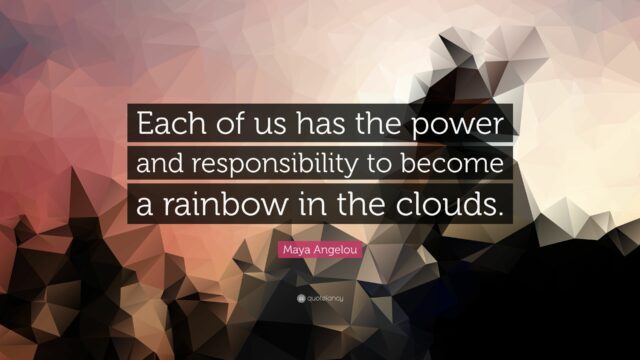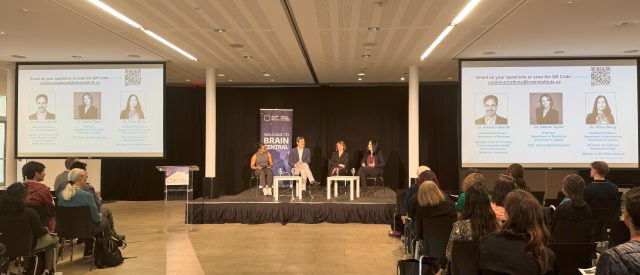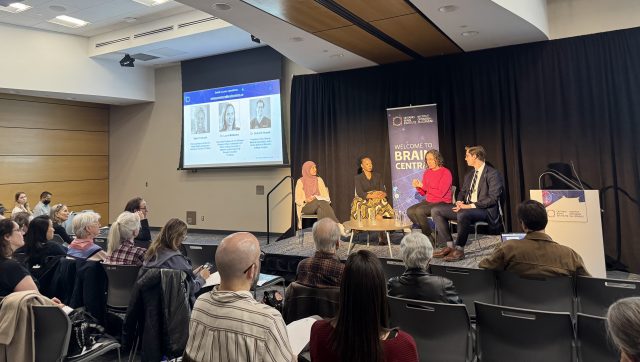N1, diagnosed with ADHD as an adult, completed a PhD in neuroscience. They have worked closely with research programs carried out in partnership with the Ontario Brain Institute.
N2 is currently an undergraduate student at York University. They have been living with OCD since childhood – and have brought their lived experience to the Youth Council of the Province of Ontario Neurodevelopmental Disorders Network (POND), an OBI Integrated Discovery Program.
N1 and N2 sat down for a one-on-one discussion about brain disorders, how and when to disclose a neurological condition (if ever), self acceptance and not succumbing to society.
Can you tell us about your journey in the brain health community?
N1: I was diagnosed with ADHD last year. I went to my doctor thinking I had anxiety, but after speaking to her, she noted that I may have been feeling anxious because of some ADHD symptoms. After some additional follow-ups, I was formally diagnosed. In a way, it’s a new and old experience, as it’s something I’ve been experiencing for years. Trying medication is what made the biggest difference for me. I think that’s when I started to accept that I wasn’t imagining my symptoms.
N2: I was diagnosed with OCD; however, I haven’t used anything ever. For me, it’s just mental and using Cognitive Behavioural Therapy (CBT). Basically, I have been “CBTing” for years.
N1: Yes! I wasn’t keen on trying medication at first. I had my doctor talk to me about different options. At that point, I was already unintentionally using a lot of common techniques to manage my symptoms, so I thought medication might be worth trying.
N2: I think seeing different perspectives will really help people. My dad also has OCD and has been on all these SSRI’s and none of them would work. I guess I had some sort of biological guidance that medication wasn’t an option for me. It shows everything is on a spectrum, which is important.
What motivated you to be a part of the Breaking Stigma, Building Empowerment project?
N2: I don’t like when people are ignorant about things, especially about something that is a part of me. You should learn about it, so you become a better person.
N1: I’m still learning about the stigma that comes with it. I also want to educate people and tell them that it is a real condition. Sometimes I hear people saying, “it’s not a real disorder.” Before my diagnosis, I’d never voiced that I had ADHD “tendencies” because of how people talked about it. I’d convinced myself I was fine.
N2: The world is moving towards being open-minded and supportive, but the little day-to-day things aren’t changing along with it. It’s really shallow.
N1: I agree with that. It is very shallow… not on a deeper level.
Are there societal expectations you would like to address?
N2: I never try to succumb to society. I want people to see me as a person and equal to them.
N1: That’s interesting, because I feel the opposite way. Maybe this is because I was diagnosed really late. I feel weird going up to people at work and telling them I have ADHD now. I need space and boundaries but it feels weird to suddenly establish that with people who have known me for a while.
N2: I think that’s the difference; I never had to deal with a ‘before’ and ‘after’ because I was diagnosed young. People have always known I have OCD, so they have always treated me the same.
N1: Yes, when I told my friends and family, nobody was surprised. They all thought it made sense. But now I have answers that I’ve never had before, so it’s become more of a personal journey.
How do you deal with these societal expectations?
N2: Once people see you trying, they will want to help you and trust you as a person. People will see that you are doing your best despite what is going on. It’s hopeful and I think we should show people that we are trying our best.
N1: The biggest thing is being patient with yourself. I’m still wrapping my head around my diagnosis, and I don’t know if that’ll change anytime soon. I needed to give myself time to accept it, while being patient about how I handled it.
How do you remain resilient when you’re experiencing hardships?
N2: Tell yourself to “stop.” Stop what you’re actually doing and live with yourself. It’s okay to go through these bad things, but it is up to you to step back.
N1: I agree – step back when you need to. The disorder isn’t you, but it is part of how you function, so take that into consideration when things get tough.
N2: Just to add onto that, it’s okay to ask for help.
What role do other people have in addressing stigma?
N2: They need to openly involve themselves. Whether it is attending events, and/or providing your friends with support. Openly talking to them and genuinely actually listening. Maybe even involving yourself with research.
N1: I agree. Sit down and throw yourself into it. I want people to know that I’m not making excuses and to understand that I’m trying my best. That starts with understanding the disorder.
Are there any other barriers you would like to bring attention to that we haven’t already addressed?
N1: Day-to-day functioning as a whole. It’s difficult when you can’t plan around it. You just have to deal with it when it happens.
N2: Just life itself. On the flip side, it doesn’t have to be a negative. It can help you learn a lot about yourself and going through things will help you. It will make you feel better and make you feel accustomed to the unknowns.
Lastly, please tell us one thing about yourself that you would like others to know.
N2: I am not my diagnosis and I need more patience. I’m not any different than you are, but you need to be patient with me.
N1: I’m not my diagnosis. It hasn’t stopped me, and I can accomplish anything I want to. I think having the lived experience just gives you a more unique and creative perspective.
Resources:
The authors wish to remain anonymous for this publication, and the Ontario Brain Institute thanks them for contributing to Breaking Stigma, Building Empowerment: a storytelling project.
Breaking Stigma, Building Empowerment: a storytelling project amplifies honest and diverse narratives from advocates with lived experience within the brain health community. To read other stories from Breaking Stigma, Building Empowerment, visit https://braininstitute.ca/buildingempowerment



